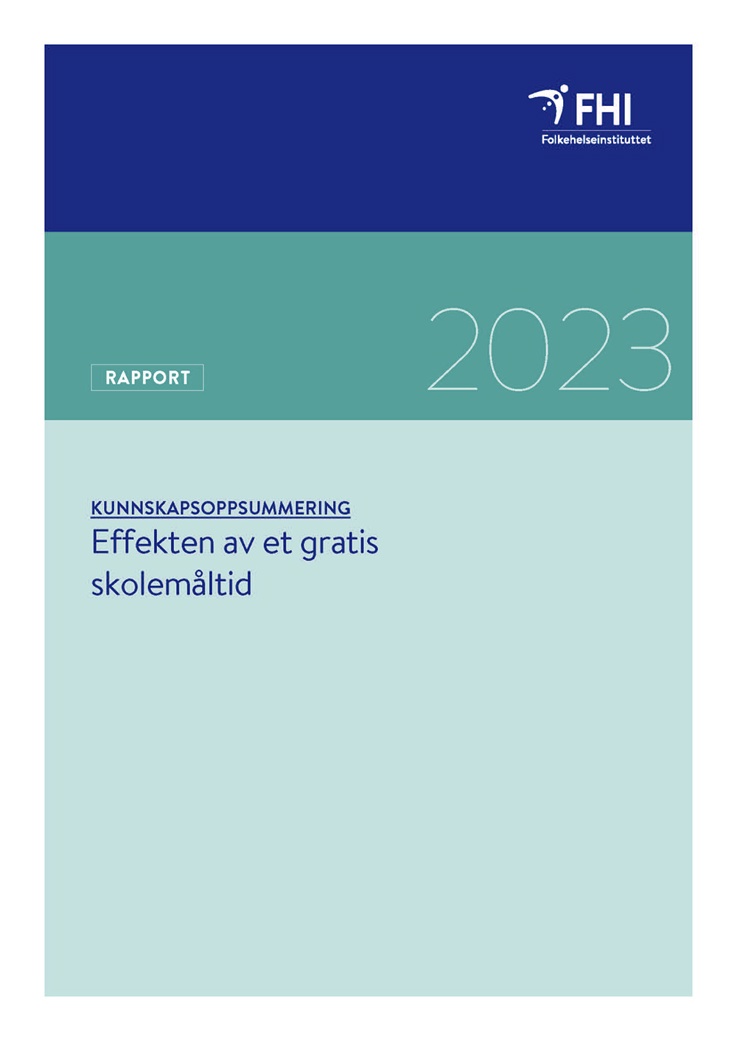The effects of providing free school meals - a summary
Report
|Published
On commission from the Ministry of Health and Care Services, and the Ministry of Education and Research, we have made a review of knowledge on schoolmeals.
Key message
• International research report positive effects of free school meals on participation, dietary quality, academic results, absenteeism, and weight development. However, it is not clear to what extent these results apply to the current Norwegian situation and context.
• The positive effect of free school meals on participation applies to participation in school meal schemes that have previously been means-tested.
• Implementing a free school meal can have positive effects on pupils’ diet, but depends on the quality of the school meal, its content, and pupils’ preferences.
• Implementing a universal free school meal could contribute to reduce social differences in diet, but depends on the quality of the school meal, content, and pupils' participation.
• What effect a free school meal might have on pupils’ weight development is unclear.
• It is unclear if a free school meal will have effects on academic performance, learning, the learning environment, and absenteeism.
• There are few studies that assess the extent to which a free school meal will be able to contribute to a more sustainable diet and possibly influence other sustainability goals.
• In high-income countries, such as Norway, there is a need for new studies assessing the effect of free school meals on various outcomes.
Summary
Introduction
Free school meals are seen as a measure that can affect both health-related and school-related outcomes. The purpose of this report is to summarize research assessing the effect of free school meals. Key outcomes are school meal participation, weight status, diet, academic performance, absenteeism, and social inequality. In addition to these outcome measures, we will describe the school meal in terms of sustainability.
Methods
As a starting point, we used a recently published systematic review (Cohen, 2021), which summarized the effects of free school meals in high-income countries. Furthermore, we carry out three literature searches to identify 1) systematic literature review studies published in the last 10 years, 2) more recent empirical studies published in 2021 and 2022 (an update of Cohen), and 3) empirical studies published in the Nordic region (without time limitation). In addition, we included relevant studies from the literature lists of included studies. To give a richer description of the potential effects of school meals, or other relevant considerations, we also describe gray literature, such as previous reports and evaluations from Norway. This was done unsystematically.
Results
One systematic review, eight empirical studies, published in 2021 and 2022, and 13 studies from the Nordic region, as well as three studies from literature lists of the included studies, were relevant and met the inclusion criteria. Furthermore, we describe four reports and three evaluations.
The systematic review showed that the majority of included studies reported that free school meals, especially lunch, were associated with increased participation, improved diet and food security, and no change in weight status or reduced obesity. However, for breakfast the results were diverged.
In general, results from the Nordic studies were diverged and several studies were of low quality. The majority of the Nordic studies reported that a free school meal (breakfast or lunch) had a positive effect on a dietary outcome. Furthermore, the results suggest that a free school meal can contribute to reduce dietary social inequalities. A total of three Nordic studies examined the effect of free school meals on weight status: one reported increased weight, another increased waist circumference, and one no change in weight status. Neither of the two Nordic studies who examined the effect of free school meals on academic performance reported a clear positive effect. None of the Nordic studies reported an association between free school meals and absenteeism (two studies), well-being (two studies), or school environment (two studies). Only one study from Denmark examined the effect of introducing a free school on food waste. The results showed that a warm school meal led to more food waste compared to a packed lunch. Two studies, who examined the long-term effects of free school meals implemented in the 1920 and 1930, reported that access to free school meals led to increased years of education and higher lifetime income.
Discussion
There is a fair amount of research that examines the effect of a free school meal, but these have limited relevance for the Norwegian context. There is generally a lack of relevant research examining the effects of a free school meal. The results of the studies that are transferable to a Norwegian setting are diverged.
Conclusion
The international literature report positive effects of offering a free school meal on several outcomes. However, these finding are to a lesser extent applicable to a Norwegian context. There is a lack of high-quality studies, conducted in Norway and other comparable counties, assessing the effects of implementing free school meals.


